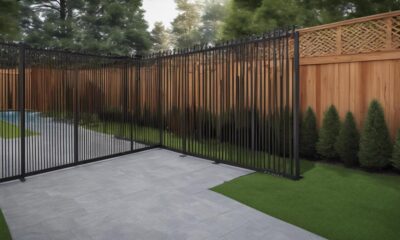Garage Door Opener
What Are Dip Switches in a Garage Door Opener?
Mystified by dip switches in garage door openers? Unravel their hidden importance for your property's security and functionality.
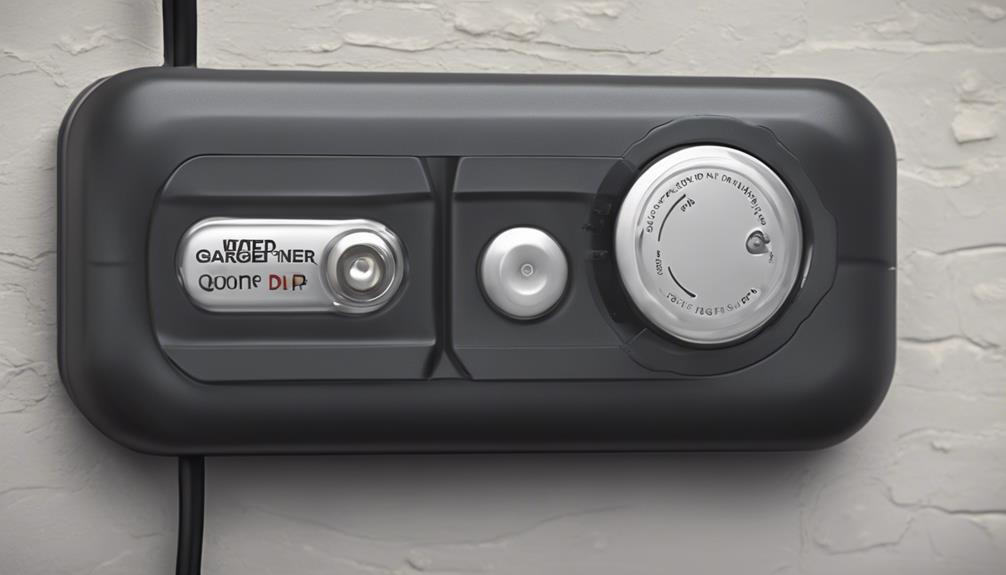
When it comes to garage door openers, we frequently fail to recognize the small but essential parts that are critical to their functioning.
Dip switches, despite their unassuming appearance, hold a key function that impacts the security of your garage.
Understanding how dip switches work and their implications is essential for ensuring the safety of your property.
Let's uncover the mystery behind these inconspicuous switches and explore their significance in the realm of garage door technology.
Key Takeaways
- Dip switches establish unique codes for secure communication.
- They ensure reliable synchronization between remote controls and receivers.
- Dip switches offer a cost-effective and user-friendly solution.
- Upgrading to modern technology enhances security and convenience.
History of Dip Switches
Exploring the Evolution of Dip Switches in Electronic Devices, dip switches have played a significant role in the history of garage door opener systems. These older technology components were crucial for establishing unique communication codes between remote controls and receivers. By allowing manual selection of configurations through toggling the switches on or off, dip switches enabled the customization of settings for garage door systems.
While newer technologies have largely replaced dip switches in modern electronic devices, their reliability in securely setting codes has kept them in use in some garage door opener systems.
In the realm of garage door opener technology, dip switches have a storied past. They were instrumental in creating secure and unique codes for communication between the remote control and receiver. Through manual selection of configurations, dip switches provided a dependable method for setting up the communication protocols in garage door systems. Despite advancements in technology, dip switches remain a trusted component in certain garage door opener systems due to their proven reliability in establishing secure codes.
Functionality of Dip Switches
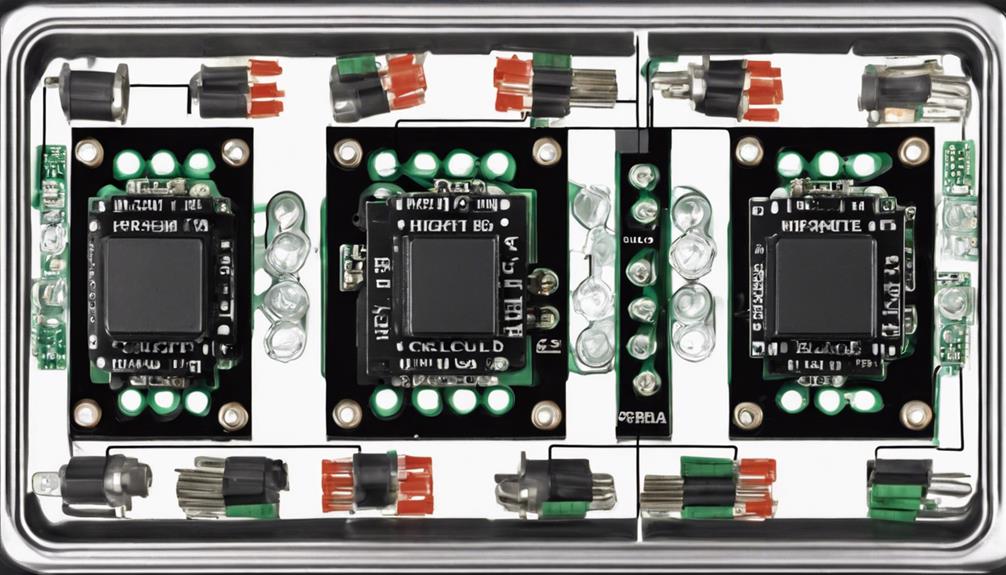
The functionality of dip switches in a garage door opener involves setting configuration options for communication between the remote control and the receiver. Dip switches play a crucial role in ensuring the secure and reliable operation of the garage door system.
Here are some key points about the functionality of dip switches:
- Dip switches create a unique code sequence that allows the receiver to recognize and respond to commands from the remote control.
- Proper synchronization of dip switches is essential for accurate communication between the remote control and the garage door opener receiver.
- Dip switches establish a secure connection, preventing interference from other devices and ensuring the reliable operation of the garage door system.
- They're integral in maintaining a consistent and secure link between the remote control and the garage door opener, enhancing the overall functionality of the system.
Pros and Cons of Dip Switches
Utilizing dip switches in garage door openers presents both advantages and disadvantages worth considering. Dip switches offer a user-friendly and straightforward solution for both installation and operation of the garage door opener. Their basic design contributes to reliability, as they're less prone to technical malfunctions compared to more complex systems. Additionally, dip switches provide compatibility with various types of garage doors, making them a versatile choice for homeowners.
On the downside, one of the cons of dip switches is that they may not offer the same level of security as more advanced systems. Since dip switches have a limited number of codes, there's a possibility of code duplication, potentially compromising security. However, for those seeking a cost-effective option that's easy to install and operate, dip switches remain a viable choice for garage door openers.
It's essential to weigh the pros and cons based on your specific needs and priorities when selecting a garage door opener system.
Troubleshooting Dip Switch Problems
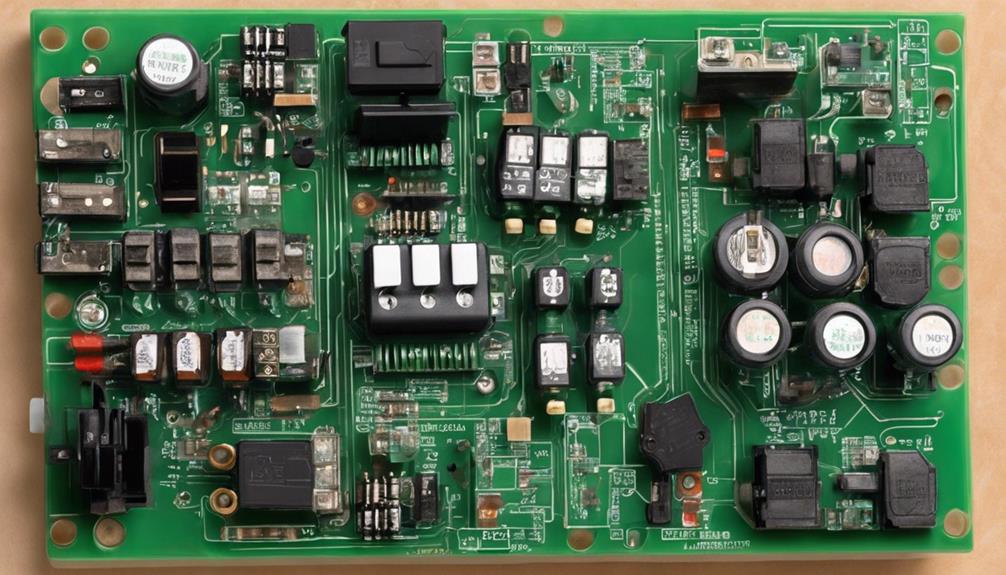
When troubleshooting dip switch problems in a garage door opener, ensuring proper alignment and configuration of the switches is crucial for seamless operation. Misaligned dip switches can disrupt communication between the remote control and the receiver, leading to issues with the garage door opener's responsiveness. Here are some key troubleshooting steps to address dip switch problems effectively:
- Check for proper alignment of the dip switches.
- Verify the configuration of the communication code.
- Ensure synchronization between the remote control and the receiver.
- Address any issues related to weak signal transmission, which may indicate low battery power affecting the dip switch communication.
Upgrading From Dip Switches
Consider upgrading from dip switches to modern garage door openers for enhanced security and convenience. When upgrading, you benefit from advanced features like rolling code technology, which changes the access code each time the door is operated, greatly enhancing security.
Modern garage door openers also offer smartphone control, allowing you to operate your garage door from anywhere, adding a layer of convenience to your daily life.
Safety is paramount, and modern openers come equipped with safety sensors that detect obstructions and prevent accidents. Additionally, the upgrade provides a quieter operation, reducing noise pollution and creating a more peaceful environment.
To ensure optimal performance and functionality, professional installation is recommended. This guarantees that all components are set up correctly and work seamlessly together.
Frequently Asked Questions
When Did Garage Door Openers Stop Using DIP Switches?
Garage door openers stopped using DIP switches in the early 2000s, transitioning to rolling code technology for improved security. This change was necessary to combat vulnerabilities like code duplication and unauthorized access.
The shift away from DIP switches significantly enhanced the overall security of garage door openers. Nowadays, modern systems utilize advanced encryption methods to provide robust protection against hacking attempts.
Does Genie Garage Door Opener Have DIP Switches?
We don't mess around with DIP switches in Genie garage door openers! Our systems employ cutting-edge rolling code technology for top-notch security. Each time you use the remote, a fresh code is issued, making it virtually hack-proof.
With features like Intellicode encryption, we keep your codes safe from prying eyes. Say goodbye to manual configurations; our focus on modern security trumps outdated DIP switch setups for hassle-free, secure access.
Does Liftmaster Have DIP Switches?
We don't use DIP switches in our Liftmaster garage door openers. Our systems rely on advanced rolling code technology for top-notch security.
DIP switches aren't part of our setup, ensuring enhanced protection from unauthorized access. Our focus on innovation guarantees a secure and convenient garage door opening experience without the need for DIP switches.
Trust in Liftmaster for cutting-edge technology that keeps your property safe and secure.
Do Chamberlain Remotes Have DIP Switches?
We don't have dip switches in our Chamberlain remotes. Our remotes utilize advanced rolling code technology to ensure secure communication by creating a new code every time the remote is used. This feature enhances security and eliminates the need for manual configuration.
With keyless entry and remote monitoring, our remotes offer convenience and peace of mind. Trust in our secure communication protocols for a worry-free experience.
Conclusion
In conclusion, dip switches in a garage door opener are like the outdated security system of a castle – easy to breach and in need of an upgrade.
With limited code combinations and vulnerability to unauthorized access, it's time to leave behind this antiquated technology.
Upgrade to a more secure and advanced system to ensure the safety and security of your garage and belongings.
Don't let your garage door be the weak link in your fortress.
- About the Author
- Latest Posts
Introducing Ron, the home decor aficionado at ByRetreat, whose passion for creating beautiful and inviting spaces is at the heart of his work. With his deep knowledge of home decor and his innate sense of style, Ron brings a wealth of expertise and a keen eye for detail to the ByRetreat team.
Ron’s love for home decor goes beyond aesthetics; he understands that our surroundings play a significant role in our overall well-being and productivity. With this in mind, Ron is dedicated to transforming remote workspaces into havens of comfort, functionality, and beauty.
Garage Door Opener
How Long Does It Take to Install a Garage Door Opener: 10 Easy Steps
Discover the surprising truth about how long it really takes to install a garage door opener in just 10 easy steps!
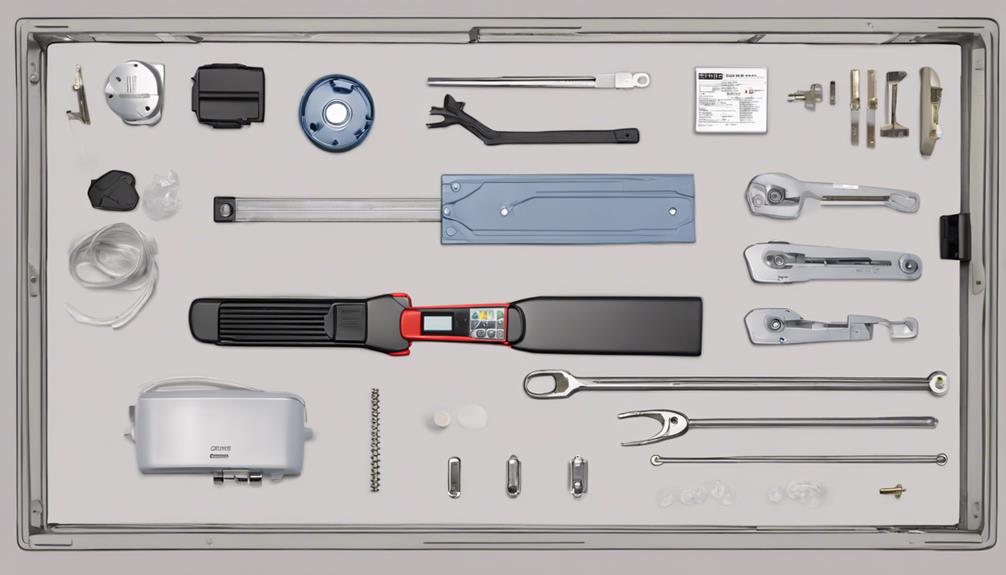
We have all heard the expression, “Rome wasn’t built in a day,” and that sentiment remains accurate when it comes to installing a garage door opener.
Have you ever wondered just how long it takes to complete this task efficiently and effectively?
Well, in this discussion, we'll uncover the steps involved and provide insights into the time it typically takes to install a garage door opener.
So, let's explore this process together and shed light on what it entails.
Key Takeaways
- Proper preparation and tool gathering is essential for a successful installation.
- Ensure garage door readiness, balance, and clear workspace before starting.
- Follow installation steps meticulously for a smooth and efficient process.
- Test the system, adjust settings, and program sensors accurately for optimal functionality.
Gathering Necessary Tools and Materials
To begin the installation process of a garage door opener, gather essential tools such as a power drill, wrench set, screwdrivers, and a ladder, ensuring readiness for a smooth and efficient setup. It's crucial to have the garage door opener kit, mounting hardware, and safety sensors at hand. These components are vital for a successful installation.
Additionally, having a level, measuring tape, and safety glasses ready will ensure precise installation and safety throughout the process. Before starting, creating a stable work surface and clearing the area around the garage door will provide easy access and a clutter-free environment for installation tasks.
Organizing all components and thoroughly reading the manufacturer's instructions is key to understanding the assembly process and ensuring everything is correctly set up. By having all the necessary tools and materials prepared, we set ourselves up for a hassle-free and successful garage door opener installation experience.
Preparing the Garage Door for Installation
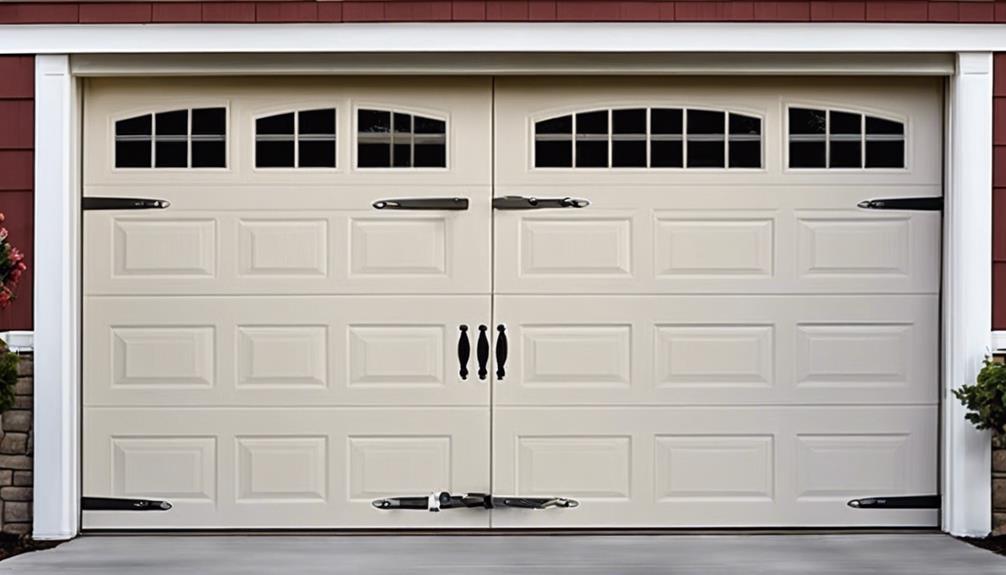
Before proceeding with the installation of the garage door opener, ensuring that the power to the garage door has been disconnected is imperative. This step is crucial for safety reasons and to prevent any accidents during the setup process.
Once the power is off, it's essential to clear the area around the garage door opener. This ensures a safe and accessible workspace for the installation. Additionally, verifying that the garage door is balanced and functioning properly is key to avoiding any issues later on.
By following the manufacturer's instructions diligently, you can gather all the necessary tools and materials required for a smooth installation process. Reading through the guidelines provided by the manufacturer will help you understand the pre-installation requirements and steps involved.
Taking these preparatory steps will make the installation of your garage door opener easier and more efficient.
Attaching the Header Bracket
After ensuring the power to the garage door is disconnected and the workspace is clear, the next step in installing a garage door opener is attaching the header bracket.
The header bracket is a crucial component as it connects the carriage tube to the wall, providing stability during the garage door opener's operation. Proper installation of the header bracket is vital for the smooth functionality of the opener. It's essential to attach the header bracket at the correct height to ensure optimal performance.
Additionally, the header bracket plays a key role in supporting the weight of the garage door opener, making its secure attachment crucial. Following the manufacturer's instructions for attaching the header bracket is imperative for a successful installation.
Installing the Rail and Trolley
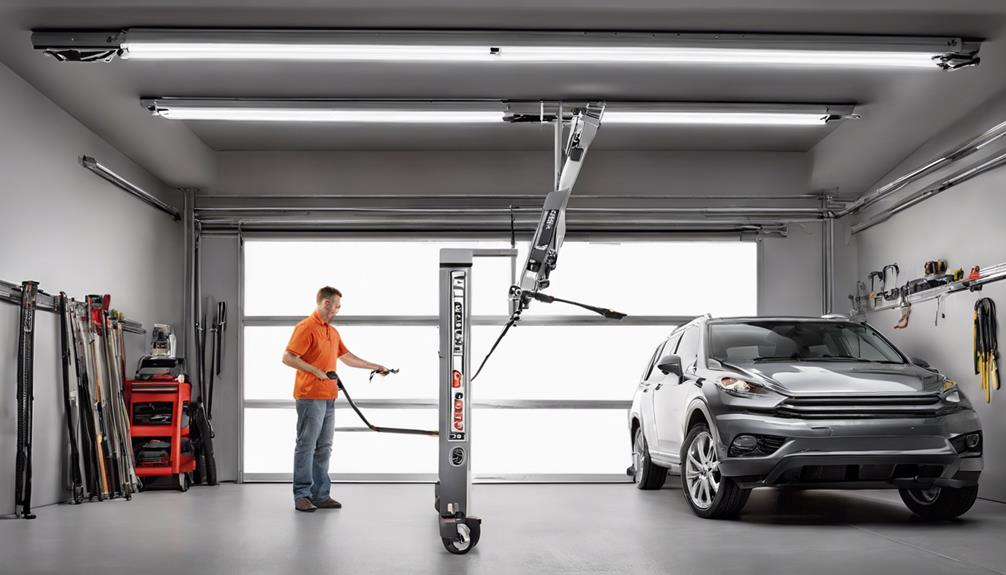
When installing the rail and trolley for the garage door opener, we typically start by securely fastening the rail to the motor unit. Ensuring a solid connection at this stage is crucial for the overall functionality of the system.
Here are the key steps to successfully installing the rail and trolley:
- Secure the Rail to the Motor Unit: Use the provided hardware to firmly attach the rail to the motor unit, following the manufacturer's instructions.
- Attach the Trolley to the Rail: Slide the trolley onto the rail and secure it in place according to the provided guidelines to enable smooth movement.
- Connect the Trolley to the Garage Door: Properly link the trolley to the garage door to establish the necessary connection for operation.
- Secure All Parts: Double-check all connections and fasteners to ensure everything is tightly secured, minimizing the risk of accidents or malfunctions.
- Test Functionality: Before completion, test the functionality of the rail and trolley system to confirm smooth operation and address any issues promptly.
Mounting the Motor Unit
Securing the motor unit to the ceiling using metal straps or angle irons is a critical step in mounting the garage door opener system. When mounting the motor unit, it's essential to position it at least 7 feet above the ground to ensure safe and efficient operation. Proper attachment of the motor unit to the ceiling is crucial for stability and to prevent vibrations that may occur during the garage door's operation.
To achieve a secure attachment, follow the manufacturer's instructions meticulously. These instructions are designed to guide you through the process and help avoid installation errors that could impact the functionality of the garage door opener. By adhering to the guidelines provided by the manufacturer, you can ensure that the motor unit is mounted correctly and securely, promoting smooth and reliable operation of your garage door opener.
Connecting the Opener to Power
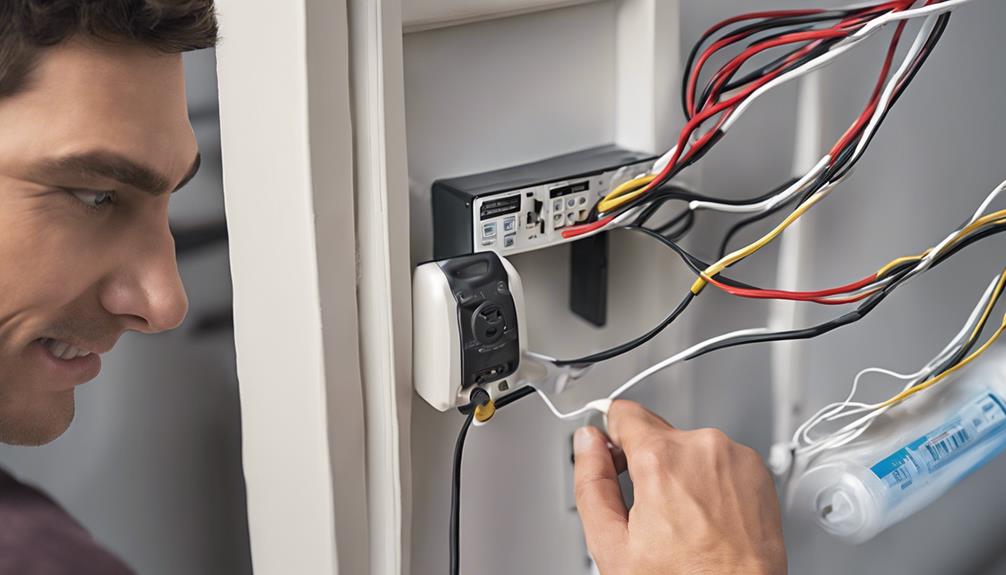
Let's start by plugging in the power cord to the nearby electrical outlet.
It's crucial to check the compatibility of the outlet with the garage door opener.
We need to securely fasten the electrical connections to ensure safe and reliable operation.
Plug in Power Cord
To ensure reliable functionality, securely plug the power cord of the garage door opener into a standard electrical outlet following the manufacturer's guidelines. Make sure to:
- Verify the power cord is firmly connected to the opener.
- Ensure there's a nearby power source accessible.
- Follow the manufacturer's instructions for the correct socket.
- Double-check the power cord connection for proper power supply.
- Confirm the power cord is securely plugged in to operate the opener effectively.
Check Outlet Compatibility
After ensuring the power cord is securely plugged into the garage door opener, the next step is to check the compatibility of the outlet for connecting the opener to power.
For a successful garage door opener installation, the outlet must be a standard one within reach of the opener, grounded, and providing the required voltage. It's crucial to verify the outlet's accessibility and ensure it's in good working condition. Professional installers possess the expertise to assess outlet compatibility and make any necessary adjustments during the installation process.
Secure Electrical Connections
Securing the electrical connections for a garage door opener involves ensuring proper wiring techniques and secure connections to prevent potential electrical hazards. When connecting your garage door opener to power, follow these key steps:
- Check the compatibility of the electrical outlet with the opener's power requirements to avoid any operational issues.
- Utilize correct wiring techniques to maintain a safe and efficient electrical connection.
- Ensure all connections to the power source are secure to guarantee the opener functions correctly.
- Double-check the power source connections to prevent any malfunctions once the opener is in use.
- Adhere strictly to the manufacturer's instructions for electrical connections to guarantee safe and optimal operation of your garage door opener.
Adjusting and Testing the Garage Door Opener
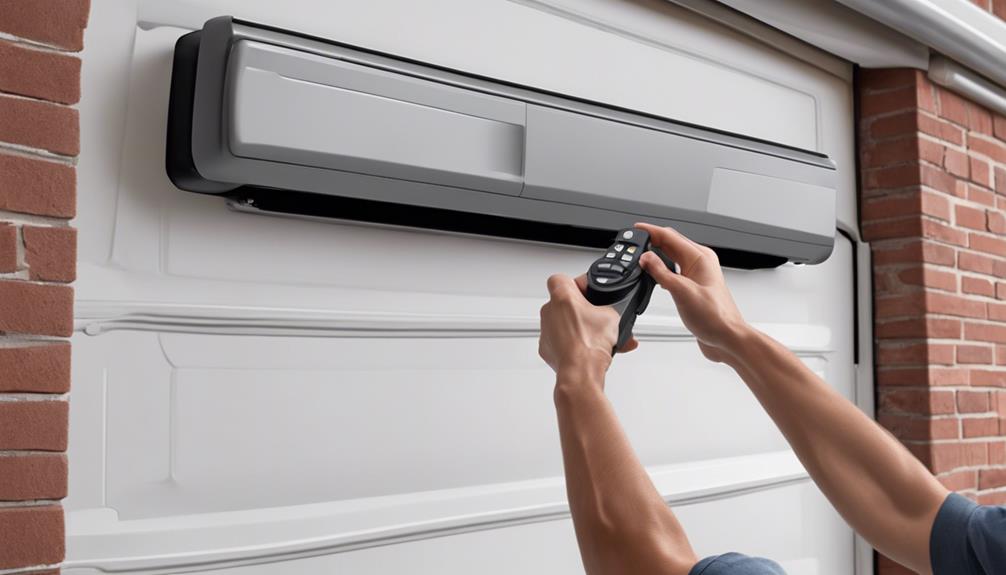
Let's ensure the garage door opener functions smoothly by:
- Confirming sensor alignment
- Testing remote functionality
- Adjusting force settings
These steps are crucial in fine-tuning the opener to operate efficiently and safely. Regularly checking and readjusting these settings will help maintain optimal performance.
Confirm Sensor Alignment
To ensure accurate sensor alignment when adjusting and testing the garage door opener, use a laser level to align the sensor mounts properly. It's crucial to mount the sensors at the appropriate height on each side of the garage door for proper function.
Additionally, route the sensor wires as directed by the manufacturer to avoid interference. After sensor installation, test the door operation and make any necessary adjustments for optimal performance.
Regularly checking and testing the safety sensors will help maintain the garage door opener's functionality. Remember, proper sensor alignment is key to ensuring the safety and efficiency of your garage door system.
Test Remote Functionality
For precise adjustment and testing of the garage door opener, it's essential to verify smooth operation by using the remote control to open and close the door.
Begin by adjusting the travel limits to ensure the door moves accurately in both directions.
Next, fine-tune the force sensitivity settings to guarantee the door stops and reverses correctly when encountering an obstruction.
To complete the process, test the remote range by operating the door from various distances within the property. This step ensures that the remote functionality is reliable and consistent.
Adjust Force Settings
Adjusting the force settings on your garage door opener ensures precise control over the amount of force exerted during operation, promoting smooth functionality and enhancing safety measures. When fine-tuning these settings, consider the following:
- Adjust the force settings to control the amount of force exerted by the garage door opener during operation.
- Testing the force settings ensures that the door closes and opens smoothly without causing damage or safety hazards.
- Proper adjustment prevents the door from closing too forcefully or reversing unexpectedly.
- Testing the force sensitivity helps in fine-tuning the settings for optimal performance and safety.
- Regularly checking and readjusting the force settings is essential for maintaining the garage door opener's functionality.
Programming the Remote Control
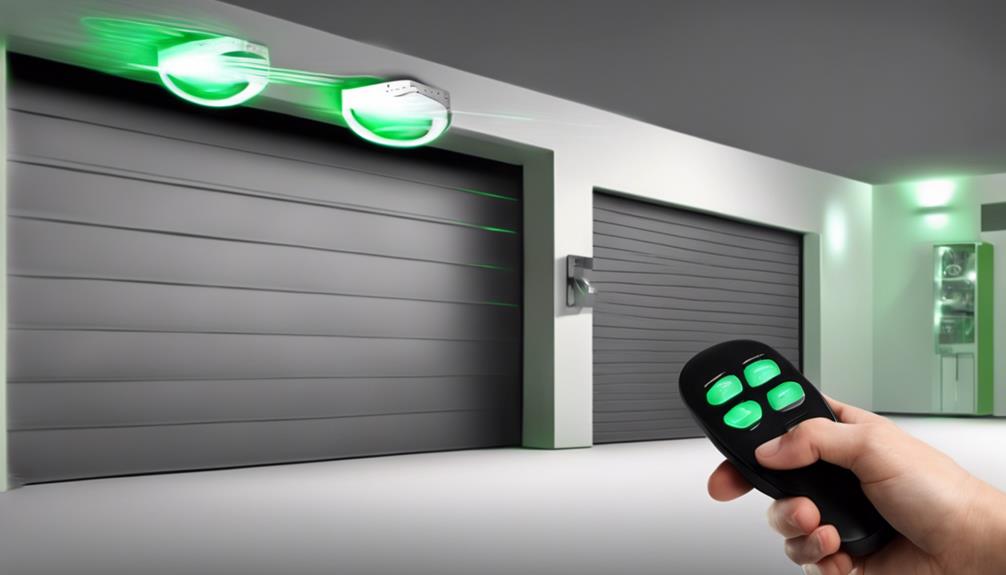
Let's initiate the remote control programming process by following the manufacturer's specific button sequence instructions. Ensure the remote control battery is fresh and properly inserted to facilitate successful programming. Some garage door openers feature a convenient learn button for easy remote programming by syncing with the opener unit. Here is a table summarizing the essential steps for programming the remote control:
| Step | Instructions |
|---|---|
| 1 | Locate the learn button on the opener |
| 2 | Press the learn button |
| 3 | Within 30 seconds, press the remote control button to sync |
Following the step-by-step guide provided with the garage door opener ensures accurate programming of the remote control. By adhering to the manufacturer's instructions and utilizing the learn button feature, the remote control programming process can be completed swiftly and efficiently. Remember, a well-programmed remote control enhances the overall functionality and convenience of your garage door opener system.
Installing Safety Sensors
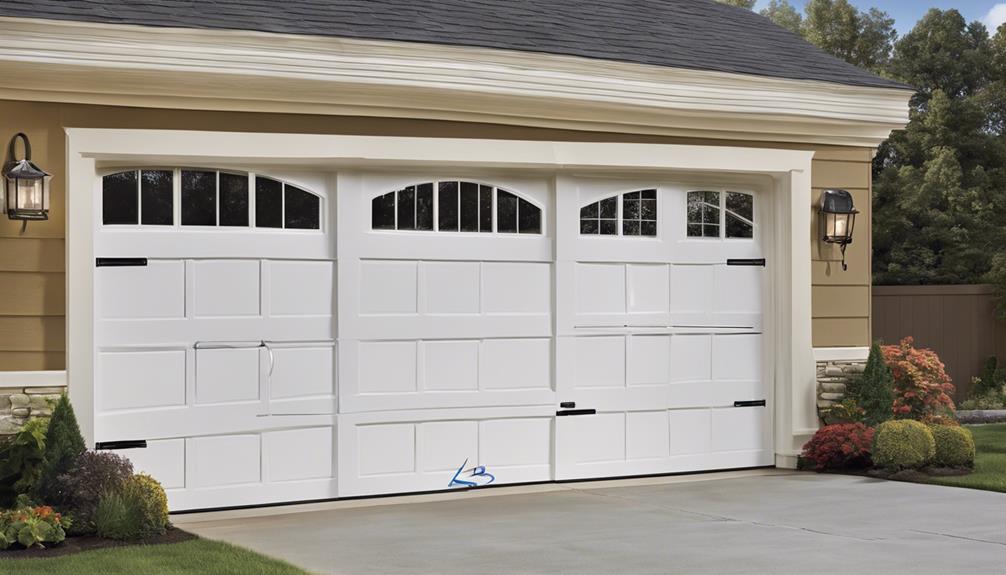
Safety sensors play a crucial role in the effective and safe operation of a garage door opener system. When installing safety sensors, attention to detail is key to ensure proper alignment and functioning. Here are some essential tips for installing safety sensors:
- Positioning: Install the sensors near the bottom of the garage door tracks, facing each other.
- Wiring: Connect the sensors to the opener unit following the manufacturer's instructions carefully.
- Alignment: Make sure the sensors are perfectly aligned to allow the infrared beams to communicate effectively.
- Testing: Test the sensors by closing the door and interrupting the beam to ensure they stop the door from closing.
- Final Check: Conduct a final inspection to guarantee the sensors are functioning correctly before completing the installation.
Final Inspection and Cleanup
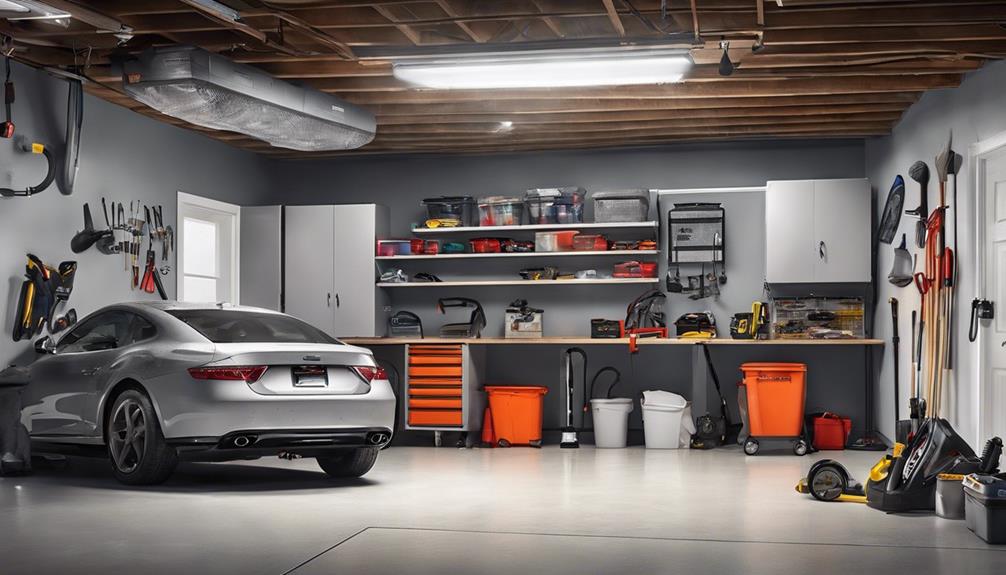
Upon completing the installation process, it is essential to conduct a thorough inspection of the garage door opener to ensure proper functionality and alignment. This final step guarantees that the opener operates smoothly and safely. Here is a detailed checklist for the final inspection:
| Inspection | Actions |
|---|---|
| Proper Installation | Check all components for secure fitting and alignment. |
| Functionality | Test the opener by opening and closing the garage door. |
| Safety Features | Verify sensors and auto-reverse mechanisms are functioning correctly. |
| Cleanup | Remove any debris or packaging materials from the installation. |
| Remote Controls | Test remote controls and keypad entry to ensure synchronization with the opener. |
Frequently Asked Questions
How Long Does It Take to Put a Garage Door Opener?
Installing a garage door opener generally takes 4 to 6 hours. The duration can vary depending on if it's a new setup or a replacement. Understanding the specific opener model is crucial for a successful installation.
DIY versus professional installation can also impact the time needed. Replacing an opener takes about 4 hours, while installing a new one might require up to 6 hours. It's essential to factor in these variables for an efficient installation process.
How Easy Is It to Install a Garage Door Opener?
Installing a garage door opener can be straightforward with the right tools and guidance. Our team has found that by following precise steps, such as aligning tracks and testing safety features, the process becomes manageable for most DIY enthusiasts.
However, we advise caution and thorough research to ensure a successful installation. Remember, safety first!
How Long Does It Take for Garage Doors to Be Installed?
Installing a garage door opener usually takes 4 to 6 hours, depending on factors like door type and size. Professional installations are quicker and more efficient.
Weather conditions can affect installation ease. Proper brackets and wiring are crucial for a smooth process.
We've found that experience and attention to detail are key to timely and successful installations.
What Is the Easiest Garage Door Opener to Install Yourself?
We find the Chamberlain B970 to be the easiest garage door opener to install independently. Its straightforward DIY installation process, complete with clear instructions and pre-programmed remote controls, makes it a breeze for homeowners.
This opener offers convenience and efficiency, allowing us to save time and money. With its user-friendly design, the Chamberlain B970 is our top choice for hassle-free self-installation.
Conclusion
In conclusion, installing a garage door opener can be a time-consuming process, but by following the 10 easy steps outlined in this article, you can ensure a smooth and efficient installation.
Remember, seeking professional help is always an option for those who want to save time and guarantee a properly functioning opener.
By taking the time to install your garage door opener correctly, you can enjoy the convenience and security it provides for years to come.
- About the Author
- Latest Posts
Introducing Ron, the home decor aficionado at ByRetreat, whose passion for creating beautiful and inviting spaces is at the heart of his work. With his deep knowledge of home decor and his innate sense of style, Ron brings a wealth of expertise and a keen eye for detail to the ByRetreat team.
Ron’s love for home decor goes beyond aesthetics; he understands that our surroundings play a significant role in our overall well-being and productivity. With this in mind, Ron is dedicated to transforming remote workspaces into havens of comfort, functionality, and beauty.
Garage Door Opener
What Makes Craftsman Diehard Garage Door Openers Stand Out?
Highly secure and feature-rich, Craftsman DieHard Garage Door Openers offer a surprising innovation that elevates home protection – discover the game-changing feature that sets them apart!
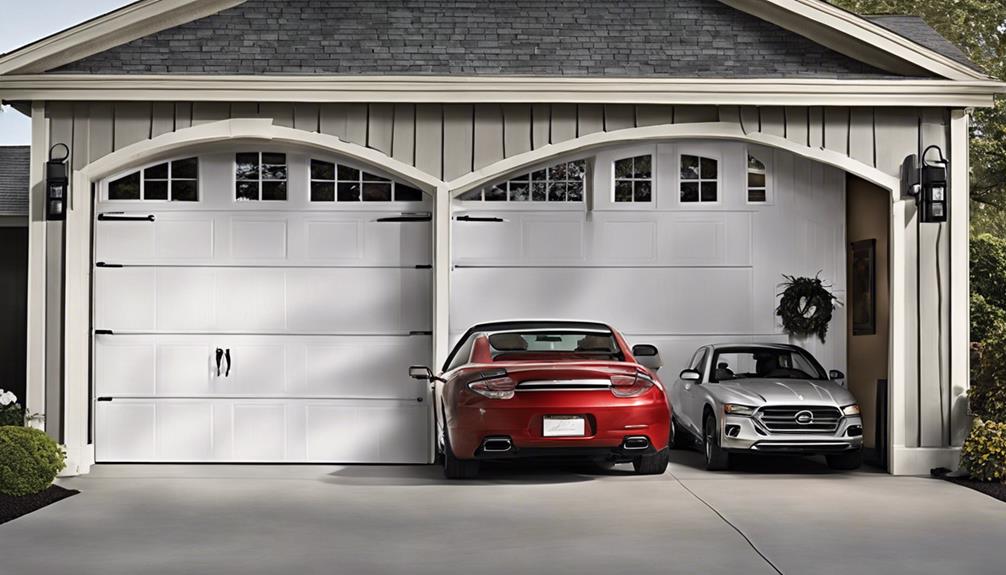
Craftsman DieHard Garage Door Openers have a unique feature that distinguishes them in the world of home security and convenience.
From robust construction to advanced security measures, these openers have garnered a reputation for reliability.
But what truly distinguishes them from the rest?
Let's explore the key factors that make Craftsman DieHard Garage Door Openers a standout choice for homeowners seeking unparalleled performance and peace of mind.
Key Takeaways
- Robust construction and durability ensure longevity and reliable performance.
- Advanced security features like Protector System® and PosiLock® prioritize safety and protection.
- Trusted and dependable performance for seamless access and property security.
- Innovative technology integration, enhanced accessibility, and convenience for user-friendly operation.
Robust Construction and Durability
Craftsman DieHard garage door openers demonstrate exceptional durability and robust construction through their use of high-quality materials and precision engineering. The sturdy build of these openers ensures longevity and reliability, making them a top choice for garage door operation.
Crafted with attention to detail, the DieHard openers can endure tough conditions and heavy usage without compromising performance. The high-quality materials used in their construction guarantee smooth opening and closing operations consistently, enhancing user experience.
These garage door openers are designed to withstand all-weather conditions, maintaining their reliability over time. The robust construction of Craftsman DieHard openers sets them apart, providing peace of mind and confidence in their long-term performance. With a focus on durability and quality materials, these openers deliver on their promise of reliable and efficient garage door operation.
Advanced Security Features
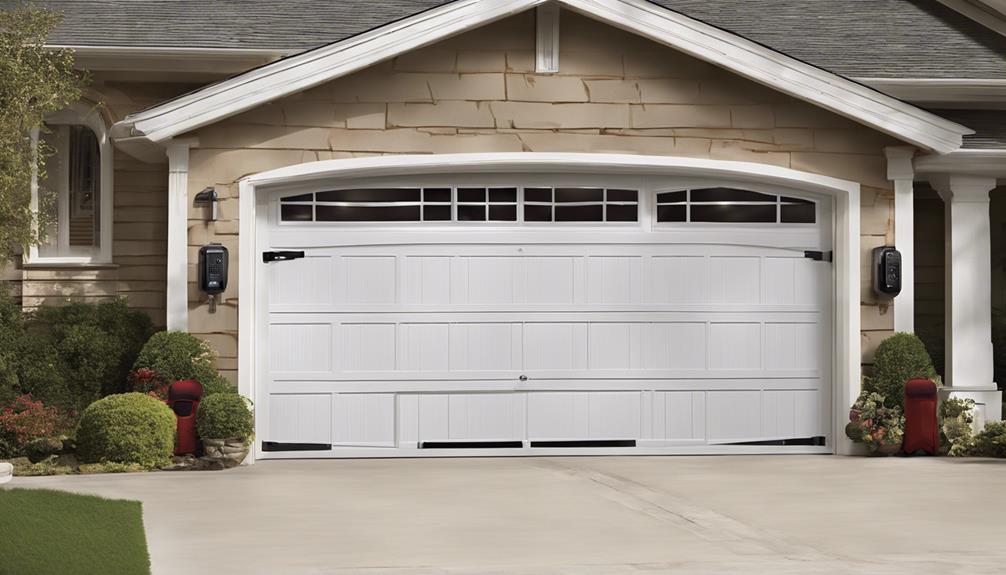
Demonstrating a commitment to safety and security, Craftsman DieHard garage door openers incorporate advanced features that prioritize protecting your home and belongings.
The Protector System® utilizes safety reversing sensors with Rapid-Snap® brackets to prevent door closure in the presence of obstructions, enhancing overall safety. Additionally, the PosiLock® System ensures that the garage door is securely locked, providing added security and peace of mind.
The anti-burglary Coding Technology enhances safety by offering unique remote codes, reducing the risk of unauthorized access to your garage. In the event of power outages, the integrated DieHard® Battery Backup kicks in, allowing for continuous operation without compromising security.
Craftsman DieHard garage door openers are designed with your protection in mind, incorporating these advanced security features to safeguard your property effectively. Trust in the reliability and innovation of Craftsman to provide a secure environment for your home and family.
Trusted and Dependable Performance
Known for their consistent and reliable performance, Craftsman DieHard garage door openers stand out for their trusted operation and durability. These openers provide a dependable solution for ensuring seamless access to your garage. With a focus on preventing lockouts and maintaining a high level of functionality, Craftsman DieHard openers offer users peace of mind knowing that their garage door will operate smoothly. The integrated safety features prioritize security, adding an extra layer of protection for your property.
Craftsman DieHard garage door openers are renowned for their long lifespan, making them a reliable choice for homeowners seeking a durable solution. The remote control mechanism is designed to be both responsive and easy to use, enhancing the overall user experience. Whether you're arriving home after a long day or heading out for errands, the Craftsman DieHard opener ensures that accessing your garage is a hassle-free and secure process.
Innovative Technology Integration
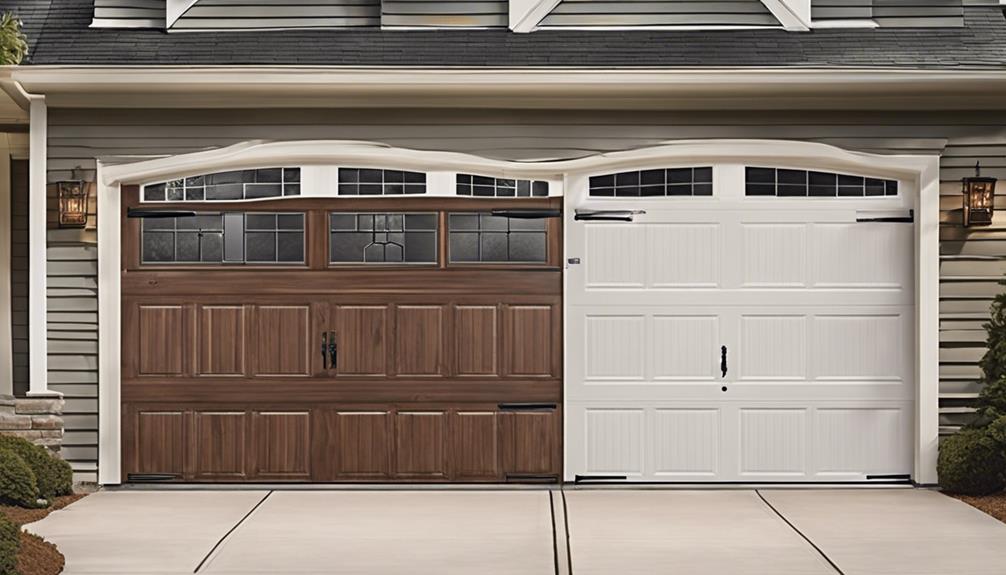
Utilizing cutting-edge technology integration, Craftsman DieHard garage door openers offer advanced features for enhanced performance and convenience. The commitment to innovation is evident through the integration of the DieHard® Battery Backup, Tri-Frequency Radio System, and Smart Motion LCD Wall Control. This dedication to research and development ensures Craftsman DieHard garage door openers stand out in the market.
- DieHard® Battery Backup: Provides up to 20 open and close cycles during power outages, delivering uninterrupted functionality.
- Tri-Frequency Radio System: Ensures interference-free operation for reliable performance.
- Smart Motion LCD Wall Control: Offers system information and diagnostics, enhancing control and convenience.
- Energy Efficiency: Operates on only one watt of power in sleep mode, promoting sustainability and cost-effectiveness.
Craftsman DieHard garage door openers prioritize quality control and advanced features, making them a top choice for those seeking a dependable and technologically advanced garage door opener.
Enhanced Accessibility and Convenience
Enhancing user accessibility and convenience, Craftsman DieHard garage door openers incorporate a range of features designed to streamline operation and provide ease of use. The wireless keyless entry pad allows for convenient PIN access, while the Smart Motion LCD Wall Control offers system information at a glance. The time-to-close feature automates closing, adding convenience to daily routines. With two Multi-Function Remotes and Keypad, easy access and control options from a distance are ensured. The user-friendly interface guarantees a seamless and intuitive operation for all users.
| Feature | Description | Benefits |
|---|---|---|
| Wireless Keyless Entry Pad | Allows for convenient PIN access | Easy entry without the need for keys |
| Smart Motion LCD Wall Control | Provides system information at a glance | Quick access to important system data |
| Time-to-Close Feature | Automates closing process | Adds convenience by eliminating the need for manual closing |
Frequently Asked Questions
Is Craftsman a Good Brand for Garage Door Opener?
Craftsman is indeed a reliable brand for garage door openers. They're known for their quality, durability, and emphasis on safety features.
Craftsman's user-friendly interface and responsive remote control mechanisms make operating the garage door opener convenient.
Additionally, the integration of DieHard Battery Backup ensures functionality even during power outages, enhancing the overall reliability of Craftsman garage door openers.
What Is the Difference Between Chamberlain and Craftsman Garage Door Opener?
When comparing Chamberlain and Craftsman garage door openers, Craftsman focuses on safety and user-friendly features, while Chamberlain offers a wider range of connectivity options.
Craftsman emphasizes security and functionality, appealing to those seeking reliability. Chamberlain's variety of models with different technologies and price points cater to diverse needs.
Ultimately, the key differences lie in Craftsman's emphasis on safety and user-centric design, contrasting with Chamberlain's focus on connectivity and technology.
Who Makes the Best Garage Door Openers?
We believe the best garage door openers combine reliability, durability, and advanced features for optimal performance. Safety should be a top priority, along with convenient remote access options. Brands like Craftsman, Chamberlain, and LiftMaster are known for offering quality products that meet these criteria.
Consider factors such as motor power, noise levels, and smart technology integration when determining the best garage door opener for your needs.
What Is the Life Expectancy of a Craftsman Garage Door Opener?
Craftsman garage door openers generally last 10-15 years with regular care. Their robust build and durable parts contribute to their longevity. Proper installation and periodic lubrication can further prolong their lifespan. Warranties, running from 3 to 10 years, ensure reliability and assistance.
However, the actual lifespan can vary depending on usage and environmental conditions. Have you ever wondered what makes Craftsman garage door openers so enduring?
Conclusion
In conclusion, Craftsman DieHard Garage Door Openers truly stand out with their unmatched durability, advanced security features, and innovative technology integration.
It's ironic how something as simple as a garage door opener can bring such convenience and peace of mind to our daily lives.
With their trusted performance and enhanced accessibility, these openers prove to be a reliable and dependable choice for any homeowner.
- About the Author
- Latest Posts
Introducing Ron, the home decor aficionado at ByRetreat, whose passion for creating beautiful and inviting spaces is at the heart of his work. With his deep knowledge of home decor and his innate sense of style, Ron brings a wealth of expertise and a keen eye for detail to the ByRetreat team.
Ron’s love for home decor goes beyond aesthetics; he understands that our surroundings play a significant role in our overall well-being and productivity. With this in mind, Ron is dedicated to transforming remote workspaces into havens of comfort, functionality, and beauty.
Garage Door Opener
Garage Door Opener Size Chart: Finding the Perfect Fit
Puzzle over the perfect garage door opener size with our comprehensive guide, unlocking the key to smooth operation and peace of mind.

Have you ever attempted to fit a square peg into a round hole? Well, choosing the correct size garage door opener can often feel like a similarly challenging task.
But fear not, as we've uncovered the key to unlocking the perfect fit that guarantees seamless operation and peace of mind.
Understanding the nuances of opener sizes is just the beginning; stay tuned to discover how this seemingly small decision can make a big impact on your daily convenience and the longevity of your garage door system.
Key Takeaways
- Match opener horsepower with door weight for optimal performance.
- Proper sizing reduces strain, increases longevity, and ensures safety.
- Consult professionals for expert guidance on selecting the right opener size.
- Correct sizing minimizes wear, noise, and energy consumption for efficiency.
Understanding Garage Door Opener Sizes
When selecting a garage door opener size, it's crucial to understand the relationship between horsepower and the weight of the garage door for optimal efficiency and safety. Garage door opener sizes vary based on the horsepower needed to lift specific door types.
For instance, one-car steel doors typically require ½ horsepower openers, while two-car wood doors may need 1-1 ¼ horsepower openers. Ensuring that the opener's horsepower matches the weight of the garage door is essential to prevent motor strain, premature failure, and energy wastage.
Deciphering Garage Door Opener Charts

Deciphering garage door opener charts involves analyzing motor horsepower requirements for various door sizes to ensure optimal performance and longevity. These charts provide essential information to match the garage door weight with the right motor horsepower, preventing strain on the opener and ensuring efficient operation. Additionally, they outline the considerations for selecting the appropriate drive type, whether it be a chain, belt, or screw drive opener, based on the door size and material. By understanding these charts, one can make informed decisions to achieve the best results for their garage door system.
| Garage Door Size | Motor Horsepower Required |
|---|---|
| Single-Car | 1/2 HP |
| Two-Car | 3/4 HP |
| RV Garage | 1 HP |
Analyzing these charts is crucial in choosing the right garage door opener size, as it directly impacts the opener's ability to lift the door effectively. By selecting the correct motor horsepower for the door size, one can ensure optimal performance and longevity of the garage door opener.
Selecting the Right Opener Size
To ensure optimal performance and longevity of your garage door opener, it's crucial to accurately match the horsepower of the opener with the weight and size of your garage door. When selecting the right opener size for your residential garage door, consider the size of the door first.
For a single-car garage, openers ranging from 1/2 to 3/4 horsepower are typically sufficient. However, if you have a larger or heavier door, like those found in two-car garages or made of heavier materials such as wood, a higher horsepower opener, between 3/4 and 1, may be more suitable to handle the additional weight.
Choosing the best size garage door opener ensures smooth and efficient operation while reducing wear and tear on the opener mechanism. If you're unsure about which opener size is best for your specific door, seeking guidance from professionals like Drake Reed Door Co. can provide valuable insights tailored to your needs.
Factors Influencing Opener Size Choice

Considering the weight and material of the garage door directly impacts the selection of the appropriate opener size to ensure optimal performance and longevity. When choosing an opener, factors such as the horsepower levels recommended for single-car versus two-car garage doors and the specific requirements of insulated garage doors play a crucial role in determining the ideal size. Moreover, the type of garage door material, especially in the case of wood garage doors, necessitates careful consideration to match the opener adequately for efficient operation.
Key Factors Influencing Opener Size Choice:
- Garage Door Material: Wood garage doors typically require more powerful openers compared to steel or fiberglass doors.
- Single Car vs. Two-Car Garages: Different horsepower levels are recommended based on the size of the garage door.
- Insulation: Insulated garage doors may need higher horsepower openers for optimal functionality.
Sizing Up Your Garage Door Opener
When sizing up your garage door opener, it's crucial to consider the opener motor power, door size compatibility, and installation space requirements.
The motor power should match the weight and size of your garage door for optimal performance.
Ensure that the opener fits within the available space in your garage to guarantee smooth operation.
Opener Motor Power
How powerful should your garage door opener motor be to ensure efficient operation based on your door size and material? When selecting a garage door opener, consider the horsepower needed for optimal performance.
Here are some guidelines to assist you:
- For a one-car steel or fiberglass door, opt for a ½ or ¾ horsepower opener.
- Larger two-car steel or fiberglass doors typically require a ¾ or 1 horsepower opener.
- Insulated steel or fiberglass doors may benefit from ¾ to 1 horsepower openers for peak functionality.
Choosing the right horsepower ensures smooth and reliable operation, preventing strain on the opener and extending its lifespan. Make an informed decision based on your specific door type and size.
Door Size Compatibility
To ensure optimal performance and longevity of your garage door opener, it's crucial to match the size of the opener to the specific dimensions and material of your garage door. Garage door opener sizes are directly correlated to door sizes.
For instance, a ½ horsepower opener suits a one-car steel or fiberglass door, while a ¾ horsepower opener is ideal for a two-car steel or fiberglass door. When dealing with insulated doors, more power is necessary due to the added weight; therefore, select ¾ horsepower for a one-car insulated steel or fiberglass door, and 1 horsepower for a two-car insulated steel or fiberglass door.
Wood doors have their own requirements, with 1 horsepower sufficient for a one-car wood door, and 1-1 ¼ horsepower recommended for a two-car wood door. Properly sizing your opener ensures efficient and safe operation, preventing motor strain and enhancing the opener's longevity.
Installation Space Requirements
Considering the headroom space and backroom clearance required for various garage door opener models is essential for determining the appropriate sizing for your installation. When evaluating the installation space requirements, remember to account for:
- Headroom space: Ensure sufficient overhead space for the opener to operate without obstruction.
- Backroom space: Provide ample space behind the garage door to accommodate the opener mechanism.
- Side room clearance: Determine the space needed on each side of the door for the opener tracks and mechanisms.
Consulting with a professional installer can help ensure that the opener fits correctly in your garage layout, taking into account the specific dimensions and any structural considerations.
Finding Your Perfect Opener Fit

Measuring your garage door opening width and height accurately is crucial in finding the perfect fit for your garage door opener. To choose the right garage door opener size, consider factors such as the material and weight of your garage door. Matching the horsepower of the opener to the weight of your garage door is essential for optimal performance. Consulting with professionals like Drake Reed Door Co. can provide expert guidance on selecting the correct size for your specific needs.
Selecting an appropriately sized garage door opener is vital to avoid issues such as motor strain and unnecessary energy consumption. Using an oversized opener can lead to inefficiencies and potential malfunctions. By ensuring that the opener is the perfect fit for your garage door, you can enhance the overall functionality and longevity of your garage door system. Trusting the expertise of professionals in the field can help you make informed decisions and secure a garage door opener that meets your requirements precisely.
Frequently Asked Questions
How Do I Choose the Right Size Garage Door Opener?
We consider various factors when selecting a garage door opener size. Assess your door's dimensions, weight, and material.
Single-car doors often need ½ to ¾ horsepower, while double-car doors might require ¾ to 1 horsepower.
We also evaluate usage frequency, noise preferences, and smart feature compatibility. Seek advice from professionals for accurate sizing.
Ultimately, choosing the right size ensures optimal performance and longevity for your garage door opener.
Is 1.25 HP Garage Door Opener Too Much?
We've got the scoop on garage door opener horsepower!
A 1.25 HP opener may be excessive for standard residential doors. Matching the opener's power to the door's weight and size is crucial.
Larger or commercial doors might benefit from the extra oomph of a 1.25 HP motor. Using more power than needed can waste energy and strain the system.
Rely on professional advice to pinpoint the perfect horsepower for your garage door.
How Much Can a 3 4 Hp Garage Door Opener Lift?
We've got the info you need!
A 3/4 HP garage door opener is typically able to lift a standard two-car garage door made of steel or fiberglass. It's perfect for garage doors weighing around 300-350 pounds, providing the right amount of power for smooth and efficient operation.
We recommend matching the opener's horsepower to your door's weight and size to ensure optimal performance.
Can I Use a 7 Foot Garage Door Opener on an 8 Foot Door?
Yes, we can't recommend using a 7-foot garage door opener on an 8-foot door. It may struggle with the extra weight and size, affecting performance.
To ensure safe and efficient operation, it's best to match the opener size to the door's height. Installing a compatible 8-foot garage door opener guarantees proper functioning and system longevity.
Consulting with a professional will determine the correct size for optimal performance and longevity.
Conclusion
In conclusion, choosing the right garage door opener size is essential for efficient and safe operation.
By carefully evaluating your garage door dimensions and considering factors like material and insulation, you can ensure optimal performance and longevity.
Remember, 'measure twice, cut once' – taking the time to select the perfect fit will prevent future headaches and keep your garage door system running smoothly.
Trust the experts at Drake Reed Door Co. for guidance on finding your ideal opener size.
- About the Author
- Latest Posts
Introducing Ron, the home decor aficionado at ByRetreat, whose passion for creating beautiful and inviting spaces is at the heart of his work. With his deep knowledge of home decor and his innate sense of style, Ron brings a wealth of expertise and a keen eye for detail to the ByRetreat team.
Ron’s love for home decor goes beyond aesthetics; he understands that our surroundings play a significant role in our overall well-being and productivity. With this in mind, Ron is dedicated to transforming remote workspaces into havens of comfort, functionality, and beauty.
-

 Vetted5 days ago
Vetted5 days ago15 Best Tile Adhesives for Outdoor Use – Top Picks for Durable and Weather-Resistant Installations
-

 Beginners Guides1 day ago
Beginners Guides1 day agoDesigning Your Retreat Center – Essential Tips
-

 Beginners Guides3 days ago
Beginners Guides3 days agoAre Retreats Profitable
-

 Vetted4 days ago
Vetted4 days ago15 Creative Ways to Cover Up Popcorn Ceilings and Transform Your Space
-

 Vetted3 days ago
Vetted3 days ago15 Best Playroom Storage Solutions to Keep Your Kids' Space Organized and Fun
-

 Vetted2 weeks ago
Vetted2 weeks ago15 Best Ways to Label Clothes for Nursing Home Residents – Stay Organized and Efficient
-

 Vetted6 days ago
Vetted6 days ago15 Best Plants to Thrive on the North Side of Your House – A Gardener's Guide
-

 Vetted2 weeks ago
Vetted2 weeks ago15 Best Boxwood Varieties for Thriving in Full Sunlight

























